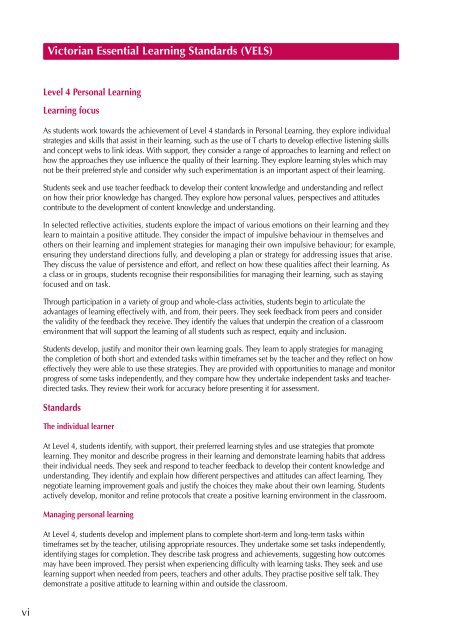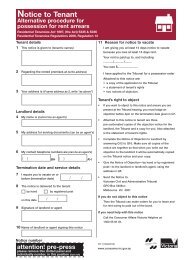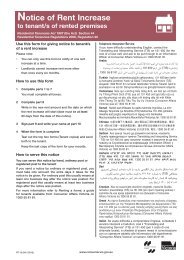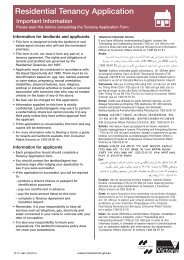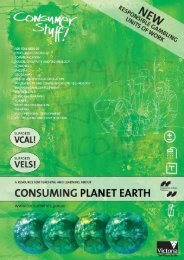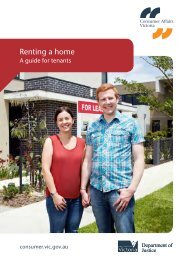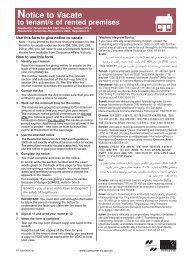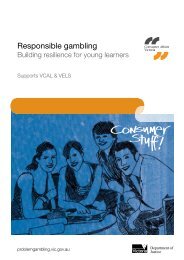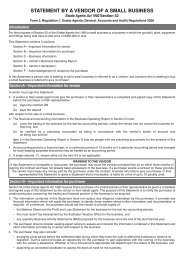Consumer Stuff for kids (PDF, 6.2 MB) - Consumer Affairs Victoria
Consumer Stuff for kids (PDF, 6.2 MB) - Consumer Affairs Victoria
Consumer Stuff for kids (PDF, 6.2 MB) - Consumer Affairs Victoria
Create successful ePaper yourself
Turn your PDF publications into a flip-book with our unique Google optimized e-Paper software.
vi<br />
<strong>Victoria</strong>n Essential Learning Standards (VELS)<br />
Level 4 Personal Learning<br />
Learning focus<br />
As students work towards the achievement of Level 4 standards in Personal Learning, they explore individual<br />
strategies and skills that assist in their learning, such as the use of T charts to develop effective listening skills<br />
and concept webs to link ideas. With support, they consider a range of approaches to learning and reflect on<br />
how the approaches they use influence the quality of their learning. They explore learning styles which may<br />
not be their preferred style and consider why such experimentation is an important aspect of their learning.<br />
Students seek and use teacher feedback to develop their content knowledge and understanding and reflect<br />
on how their prior knowledge has changed. They explore how personal values, perspectives and attitudes<br />
contribute to the development of content knowledge and understanding.<br />
In selected reflective activities, students explore the impact of various emotions on their learning and they<br />
learn to maintain a positive attitude. They consider the impact of impulsive behaviour in themselves and<br />
others on their learning and implement strategies <strong>for</strong> managing their own impulsive behaviour; <strong>for</strong> example,<br />
ensuring they understand directions fully, and developing a plan or strategy <strong>for</strong> addressing issues that arise.<br />
They discuss the value of persistence and ef<strong>for</strong>t, and reflect on how these qualities affect their learning. As<br />
a class or in groups, students recognise their responsibilities <strong>for</strong> managing their learning, such as staying<br />
focused and on task.<br />
Through participation in a variety of group and whole-class activities, students begin to articulate the<br />
advantages of learning effectively with, and from, their peers. They seek feedback from peers and consider<br />
the validity of the feedback they receive. They identify the values that underpin the creation of a classroom<br />
environment that will support the learning of all students such as respect, equity and inclusion.<br />
Students develop, justify and monitor their own learning goals. They learn to apply strategies <strong>for</strong> managing<br />
the completion of both short and extended tasks within timeframes set by the teacher and they reflect on how<br />
effectively they were able to use these strategies. They are provided with opportunities to manage and monitor<br />
progress of some tasks independently, and they compare how they undertake independent tasks and teacherdirected<br />
tasks. They review their work <strong>for</strong> accuracy be<strong>for</strong>e presenting it <strong>for</strong> assessment.<br />
Standards<br />
The individual learner<br />
At Level 4, students identify, with support, their preferred learning styles and use strategies that promote<br />
learning. They monitor and describe progress in their learning and demonstrate learning habits that address<br />
their individual needs. They seek and respond to teacher feedback to develop their content knowledge and<br />
understanding. They identify and explain how different perspectives and attitudes can affect learning. They<br />
negotiate learning improvement goals and justify the choices they make about their own learning. Students<br />
actively develop, monitor and refine protocols that create a positive learning environment in the classroom.<br />
Managing personal learning<br />
At Level 4, students develop and implement plans to complete short-term and long-term tasks within<br />
timeframes set by the teacher, utilising appropriate resources. They undertake some set tasks independently,<br />
identifying stages <strong>for</strong> completion. They describe task progress and achievements, suggesting how outcomes<br />
may have been improved. They persist when experiencing difficulty with learning tasks. They seek and use<br />
learning support when needed from peers, teachers and other adults. They practise positive self talk. They<br />
demonstrate a positive attitude to learning within and outside the classroom.


